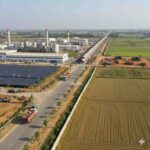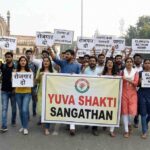Lucknow, 2025 — Uttar Pradesh (UP), India’s most populous state, has long been the crucible of Indian politics. It has not only shaped the nation’s political trajectory but also produced some of its most influential leaders. From former Prime Ministers to grassroots leaders, UP’s political landscape remains unparalleled in its ability to shape leadership at both state and national levels. This article explores the state’s unique position as the birthplace of leaders and the factors that sustain its political prominence.
The Legacy of Leadership from UP
- Prime Ministers from UP
- Jawaharlal Nehru: India’s first Prime Minister, hailing from Prayagraj, laid the foundation of modern India.
- Indira Gandhi: A transformative leader whose policies continue to influence Indian politics.
- Atal Bihari Vajpayee: Known for his statesmanship, he brought dignity and poetry to Indian politics.
- Narendra Modi: Representing Varanasi, his tenure has redefined India’s global standing and internal governance.
- Regional Leaders
- Mayawati: A Dalit icon and four-time Chief Minister, she revolutionized politics for marginalized communities.
- Mulayam Singh Yadav and Akhilesh Yadav: The Samajwadi Party leaders who brought rural and caste-based politics to the forefront.
- Yogi Adityanath: Current Chief Minister, whose leadership style has left a significant mark on UP’s development and governance.
Why UP Produces National Leaders
- Population and Diversity
- Demographic Influence: UP’s massive population, diverse communities, and intricate caste and religious dynamics provide leaders with experience in managing complexity.
- Electoral Powerhouse: With 80 Lok Sabha seats, UP often decides the balance of power in the Indian Parliament.
- Rich Political History
- Freedom Struggle: UP was central to India’s fight for independence, with cities like Meerut and Kanpur serving as key hubs of activity.
- Cultural Influence: The state’s deep-rooted traditions in debate, literature, and philosophy have nurtured political thought and leadership.
- Grassroots Politics
- Engagement: UP’s vibrant panchayati raj system provides a platform for emerging leaders to connect with local communities and build their political careers.
- Lessons in Governance: Leaders gain hands-on experience in addressing grassroots issues, preparing them for larger responsibilities.
The Challenges of Leadership in UP
- Caste and Religion-Based Politics
- Leaders often navigate a minefield of caste and religious dynamics, which can sometimes overshadow developmental priorities.
- Regional Disparities
- Bridging the economic gap between eastern and western UP is a persistent challenge for state leaders.
- Balancing Local and National Roles
- Leaders representing UP in national politics often face the dual responsibility of addressing state-specific issues while maintaining a broader national focus.
Emerging Trends in Leadership
- Youth Engagement
- With a growing young electorate, leaders from UP are focusing on youth-centric policies and digital outreach.
- Inclusive Leadership
- There is a shift towards leaders who advocate for inclusive growth, transcending traditional caste and religious divides.
- Development-Oriented Politics
- Infrastructure projects, industrial growth, and rural development are becoming key priorities for leaders to gain electoral favor.
Conclusion: A Leadership Factory
Uttar Pradesh remains a powerhouse in Indian politics, producing leaders who have left indelible marks on the nation. The state’s unique combination of diversity, historical significance, and political complexity ensures its continued role as the birthplace of influential leaders. As UP evolves, so too does its leadership, shaping not only the state’s future but also the trajectory of Indian democracy.




















